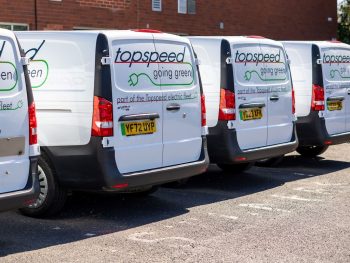Topspeed Couriers is fast-tracking its switch to electric vehicles with the help of the Webfleet fleet management solution.
 The same-day courier service has already electrified 59% of its 210-strong vehicle fleet – comprising Mercedes-Benz eVito, eCitan and eSprinter vans – and is now targeting a fully electric fleet by 2027 to help drive its commitment to net zero by 2040.
The same-day courier service has already electrified 59% of its 210-strong vehicle fleet – comprising Mercedes-Benz eVito, eCitan and eSprinter vans – and is now targeting a fully electric fleet by 2027 to help drive its commitment to net zero by 2040.
The courier’s electric fleet transformation has been enabled by the Webfleet platform.
“People told us we couldn’t electrify a courier fleet but, against all odds, we’re doing it,” said Gillian Lockley, managing director at Topspeed Couriers.
“Webfleet is proving pivotal in meeting our sustainability objectives, providing real-time data insights and dedicated EV solutions that are helping streamline our operations, promote greener driving practices and manage the unique challenges of running electric vehicles.”
Not only is the electric transition having a positive impact on the company’s carbon footprint but it’s also benefiting driver wellbeing.
Lockley explained that electric vans naturally enforce crucial rest periods by requiring drivers to take breaks for charging.
“The electric switch has been transformative,” Lockley explained. “Our drivers are now getting the rest they need, which has had a positive impact on their health, wellbeing and job satisfaction.”
The deployment of Pro 8475 driver terminals and the Webfleet Video solution across the fleet has also boosted Topspeed’s connected efficiency and safety goals.
The multi-camera system provides enhanced visibility of both road conditions and cargo security during loading and unloading, which is particularly important when transporting high-value goods.
“By analysing driving behaviour and identifying risky actions, Webfleet Video is playing a crucial role in safeguarding both our drivers and our business, improving road safety and dramatically cutting insurance claims,” Lockley added.
“With advanced AI technology that offers deeper behavioural insights, we’ve significantly reduced incidents of distracted driving. Furthermore, the solution has allowed us to refute non-fault claims more effectively.
“Claims cost have been cut by more than two-thirds as a result, leading to a reduction in our insurance premiums by £21,000 in the past year.”

